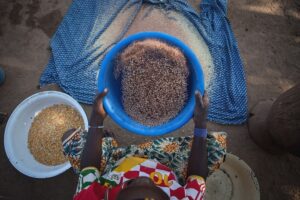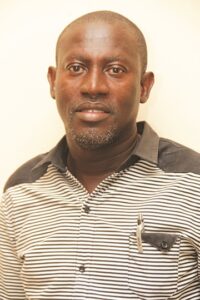Caritas Ghana, the Non-Governmental Organisation wing of the Ghana Catholic Bishops’ Conference on November 14, 2016 outdoored an Assessment Report of Ghana’s readiness to implement the new Sustainable Development Goals (SDGs).
The 52-page Report dubbed: Bringing the Sustainable Development Goals to Life in Ghana, assesses Government’s commitment and efforts towards successful implementation of the SDGs by highlighting national level structures and initiatives that were useful for sustaining national momentum.
The Report further assesses the level of consultation and involvement of relevant stakeholders like civil society and the Corporate Sector; and identifying the opportunities and gaps in Ghana’s efforts towards effective implementation.
The joy of the Catholic Church in this feat is that the Report is contributing towards increasing public awareness about the SDGs and promote civic engagement for their implementation in Ghana. There is no doubt that the citizens’ awareness about the SDGs was essential for their participation and for expressing a view on the implantation Status.
At the Sustainable Development Goals Summit on September 25, 2015, UN Member States adopted the 2030 Agenda for Sustainable Development, which includes a set of 17 Sustainable Development Goals (SDGs) to end poverty, fight inequality and injustice, and tackle climate change by 2030. The SDGs, otherwise known as the Global Goals, build on the Millennium Development Goals (MDGs), eight anti-poverty targets that the world was committed to achieving by 2015.
The SDGs is an attempt to finish the unfinished agenda of the MDGs which were not fully met. The SGDs are also aimed at setting higher goals to eradicate, rather than reduce poverty, and having higher aspirations in terms of meeting obligations for future generations.
The MDGs, adopted in 2000, aimed at an array of issues that included slashing poverty, hunger, disease, gender inequality, and access to water and sanitation. Enormous progress has been made on the MDGs, showing the value of a unifying agenda underpinned by goals and targets. Despite this success, the indignity of poverty has not been ended for all. The new Global Goals, and the broader sustainability agenda, go much further than the MDGs by addressing the root causes of poverty and the universal need for development that works for all people.
UNDP Administrator, Helen Clark noted: “This agreement marks an important milestone in putting our world on an inclusive and sustainable course. If we all work together, we have a chance of meeting citizens’ aspirations for peace, prosperity, and wellbeing, and to preserve our planet.”
Voices around the world are demanding leadership on poverty, inequality and climate change. To turn these demands into actions, world leaders gathered in September 2015 to adopt the 2030 Agenda for Sustainable Development. Paul Ladd, Director of the UNDP Team on the Post-2015 Development Agenda, spoke about 2015, a year in which countries were to shape a new development agenda and reach a global agreement on climate change.
The 2030 Agenda comprises 17 new Sustainable Development Goals (SDGs), or Global Goals, which will guide policy and funding for the next 15 years, beginning with a historic pledge to end poverty. The concept of the SDGs was born at the United Nations Conference on Sustainable Development, Rio+20, in 2012. The objective was to produce a set of universally applicable goals that balances the three dimensions of sustainable development: environmental, social, and economic.
The Global Goals replace the Millennium Development Goals (MDGs), which in September 2000 rallied the world around a common 15-year agenda to tackle the indignity of poverty. The MDGs established measurable, universally-agreed objectives for eradicating extreme poverty and hunger, preventing deadly but treatable disease, and expanding educational opportunities to all children, among other development imperatives.
At its Millennium Development Goals Summit held in September 2010, the United Nations General Assembly (UNGA) considered it necessary to begin to think of a new global development framework to replace the Millennium Development Goals (MDGs) which expired in 2015.
Since then, a series of processes have been launched aimed at creating a new global development framework. The two most important processes were those led by the Open Working Group (OWG) on the Sustainable Development Goals (SDGs) and those led by the Intergovernmental Committee of Experts on Financing for Sustainable Development (ICEFSD).
While the OWG’s focus was to propose a set of development goals for consideration by the UNGA, the ICEFSD was required to propose a set of approaches to raise the needed financial resources for implementation of the MDGs’ successor-the SDGs.
The OWG released a set of 17 goals and 169 targets in July 2014. In September 2014, the UNGA accepted to integrate the SDGs as proposed by the OWG into the post-2015 development Agenda. These goals were finalized and adopted by the UNGA in September 2015.
Ghana and SDGs
As a member of the OWG and having participated in two UN-led national level consultations, Ghana has played a significant role in defining the post-2015 Global Development Agenda. In Ghana, prior to the agreement, statements have been made by senior government officials on Ghana’s positions and/or priorities in relation to the SDGs.
Ms. Christine Asare, SDGs Focal Person in Ghana and member of the National Technical Steering Committee said in assessing the SDGs, there was the need to look at and make sure that all the three pillars that ensure sustainability were at the same level.

She advised that Ghana focuses on the socio-cultural, economic and natural resource issues as well as the Institutional issues, and that, the Environmental Protection Agency had been working with the National Development Planning Commission over the years to streamline these issues.
Speaking on the SDGs and the Post 2015 development agenda processes in Ghana, she stated that, Ghana had conducted broad consultations in three tracks: one focusing on the SDGs themselves, another on how to finance the SDGs and the other to come up with indicators for monitoring the implementation.
The new Sustainable Development Goals (SDGs) started in January 2016. For us in Africa, the new development imperative was signaled earlier by AFRICA AGENDA 2063 which establishes the Africa Development Goals (ADGs).
In Ghana, the discourse began on the Long-Term National Development Plan (40 YEARS) to climax the centenary celebration of independence in 2057! Though high ambitions, they can surely be attainable with commitment, zeal and honesty of Ghanaians.
Post-2015 Development Agenda Process in Ghana
The post-2015 development process in Ghana consists of two sets of consultations: two UN-initiated consultations, three Government-initiated consultations and civilized society-led consultations.
As one of the first 50 countries selected by the UN for national consultations on the post-2015 development agenda, two round of national consultations were organised in Ghana. Led by the UN Country team in partnership with the National Development Planning Commission (NDPC), the first round of consultations were launched in November 2012 at Tamale.
Due to the general character of the SDGs and the vast number of development issues they cover, there is a crucial need for countries to prioritise which areas are important in the national context.
Mr. Samuel Zan Akologo, Executive Secretary of Caritas Ghana (the Department of Human Development) of the National Catholic Secretariat in Accra speaking at the United Nations Post-2015 Stakeholder Steering Committee meeting in New York, on behalf of Caritas Internationlis, commended the co-chairs of the post 2015 Development Agenda for facilitating a broadly and open process negotiations of the Sustainable Development Goals.
The Session dilated on the inter-governmental negotiations (IGN), which is the next phase of monthly political dialogue meetings on the Sustainable Development Goals by Government Representatives ahead of the UN General Assembly held in September 2015. He lauded the leadership of the Secretary General on his Synthesis Report on the post-2015 Development Agenda.
These initiatives, he said, had created enthusiasm for Developing Countries and Civil Society to continue to engage with the process, noting in particular the Common African Position that has built consensus and provided a framework for engagement by Governments in Africa.
The participation of people living in poverty should continue to be the lynchpin in the implementation, monitoring and accountability of this ambitious sustainable development agenda, he added. Mr. Akologo said linkages need to be drawn between proposed goals and existing processes at national, regional and global levels, including predictable financing mechanisms to deliver our shared ambition.
A delegation from the African Union (AU), who visited Ghana in late 2015 applauded the National Development Planning Commission (NDPC) for its inclusive approach to preparing a long-term national development for Ghana. The delegation is in the country to discuss strategies for domesticating the first 10 years of the AU’s 50-year transformation agenda, known as Agenda 2063, into Ghana’s long-term national development plan.
Role of Media
Speakers at a media forum on the Sustainable Development Goals (SDGs) in Accra stressed the need for the media to actively advocate for local ownership of the goals and hold implementing actors accountable.
Ms. Christine Evans-Klock, the United Nations (UN) Resident Coordinator for Ghana, who chaired the forum, said once the SDGs are adopted; the media’s active participation in this regard would ensure that the universal goals contained in the document result in actions and policies to make a difference in the lives of citizens, rather than stay on paper.
She commended the Media Foundation for West Africa (MFWA) for the initiative to inform the general public about the SDGs, how they came about and their importance in Ghana.
“The SDGs were developed after many years of hard work, through consultations that stretched across 190 countries and which gave voice to civil society, private sector and sought the views of millions of young people,” she noted.
Ghana was one of the countries tasked to host a national consultancy on the post 2015 agenda. The consultations were organized by the National Development Planning Commission (NDPC), with the UN and other relevant agencies, including civil society organizations, development partners, private sector, religious bodies and others at regional and national levels.
In Ghana, discussions were mainly focused on a better future for young people, including the quality of education and access to decent work, whiles some focused on localizing universal development goals, owning them and mobilizing support to make a difference in Ghana.
The process of developing Ghana’s 40-year development plan, of which the first 15 years of it will be informed by the SDGs and pledged the United Nations readiness to assist Ghana in implementation strategies to achieve the goals.
Professor Kwame Karikari, SDG Ambassador in Ghana and Board Member of the Media Foundation for West Africa (MFWA), is reported to have said the MDGs did not receive the kind of sustained media advocacy; monitoring and coverage that would have added to the gains that were made and commended the MFWA for involving the media in the SDGs from the beginning.

The Writer
Compared to the MDGs, the SDGs were broader, going beyond socio-economic issues and thus required all parties to support. The SDG provided the elements for national consensus on a development agenda that was devoid of any political tinkering and urged political parties to fashion their manifestos based on it.
In my view, the Media must be focused on challenges that appear in the implementation of the goals and also how Ghanaian citizens, like civil society groups are involved in the implementation of the SDGs.
Watch out for the part 2



